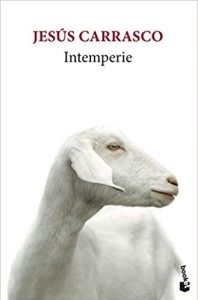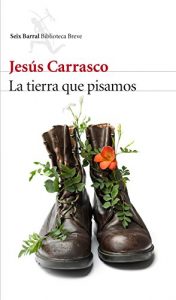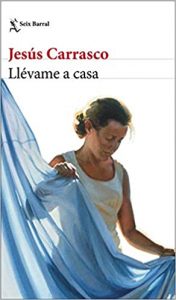It is always easier to undertake the task of selecting an author's books when we are in full and unexpected emergence. Because of Jesus Carrasco It is that irruption of the writer crouched for years and finally discovered as a whole storyteller of carats.
Carrasco's pen is fine, slow but deep when appropriate, yet spirited in her compelling portrait existentialist. A portrait that rescues and exhibits the brevity of life in its all exterior, imperishable settings subjected to an intense changing light.
It is about that, that Jesús Carrasco writes as he would paint if he knew how to paint (I don't know). And the good painter ends up knowing how to transmit much more than the first appearance. Because for that one sets out to paint or write, to try to reach us with games of colors, with winks, with descriptions that become metaphors in our imagination.
We fulfill the vision of the painting in the case of Carrasco, as we remember that he is a writer, with the notion that something always remains to be discovered, as every writer convinced of the mystery, the suspense, the tension or the repeated leitmotif must necessarily do until its final representation or its twist.
Innovative for what there is and at the same time drawn towards the most exquisite literature (from when in the past it was written for a parallel display of form and background), Jesús Carrasco is a narrative spring but also an arid landscape that makes us sweat. Enjoy its exuberance and lose yourselves at ease with its stories ...
Top recommended novels by Jesús Carrasco
Outdoor
Essential empathy. A child who flees from something atrocious, from a fear so unapproachable as to give up a home and take to the mountains in search of some opportunity. He came into my hands as a gift from a good friend. Good friends never fail in a literary recommendation, even if it is not very much in your usual line...
As I say, a child runs away from something, we don't really know from what. Despite the fear of escaping to nowhere, he knows he has to do it, he must leave his town to free himself from something that we sense is destroying him. The brave decision is transformed before our eyes into a simple need for survival, like the animal instinct of the unprotected creature.The world is a cruel wasteland. The child itself is perhaps a metaphor for the soul, for any soul that wanders lost in a hostile world, converted to that hostility in an unexpected way since tender and innocent childhood. In a supposedly ambiguous reading, you can always interpret more. For it Jesús Carrasco takes care of filling the language of prosaic, eschatological images that pass, a few lines later, to soften or shudder from rawness or filth.
Why does a child run away from its origins? How to take that trip to nowhere? The escape itself becomes the leitmotif that moves the story. A plot that progresses slowly, with the slowness typical of bad hours, so that the reader can savor the fear, the innocence, the idea of an unclear guilt for not feeling like the place where one comes from. More than anything because that place hurts. And the pain runs away, even if they tell you that it cures.It is foreseeable what will happen, what will become of the child, little or no good. But the beauty of a language fertilized in wasteland, and the hope that that inescapable destiny does not finish reaching the child, moves you to continue reading. It's about that, adding scenes that go by slowly, that present you with a set of moments as simple as they are eternal, that lower you to a hyper-real space in front of which you only expect a stroke of magic. That hidden possibility of all literature to fly over the sordid, even if it is in an impossible twist that could cover such cruelty with dignity and oblivion.
It will happen or it will not happen. Only the strong and tough hand of an old shepherd who has little to say and knows little remains of hope, beyond his vast universe that covers reality from his feet to the horizon of the moor. The shepherd as the only hope, a being oblivious of everything alien to his flock, and surely capable of abandoning a child as if it were a badly wounded lamb. What humanity will remain when closing the book?The land we step on
In the rawness of the landscapes, in the characters folded in on themselves, in the words always necessary to describe with roots or outline with lightness. In everything that Carrasco writes there is a strange compensation, surely premeditated towards the fanciful, towards the fable. It is not that it is something manifest or palpable but we do discover it in the estrangement of which he is capable with his overwhelming mastery of language, of the setting and even the dialogues.
We recognize everything as true and recognizable and yet we are being stealthily led towards the conjurer's trick.Nothing could ever be as it is presented to us, but we will be convinced of it because the strange is naturalized and the argument ends up composing a beautiful story where everything has a place, from the brilliance of the imagination to the conscious weight of the great dilemmas of the existence, life itself and death.
At the beginning of the XNUMXth century, Spain was annexed to the largest empire that Europe has ever known. After the pacification, the military elites choose a small town in Extremadura as a reward for the commanders in charge of the occupation.Eva Holman, the wife of one of them, lives her idyllic retreat in the peace of her conscience until she receives an unexpected visit from a man who will start occupying her property and will eventually invade her entire life.
The land we step on it talks about the way we relate to the earth; with the place where we are born but also with the planet that sustains us. Forms that range from the atrocious commercialism that wields power to the emotion of a man who cultivates in the shade of an oak.And between these two extremes, the struggle of a woman to find the true meaning of her life and from which her own education has diverted her.
With the same richness and precision with which he wrote Weathering, Jesús Carrasco investigates in this novel the infinite capacity for resilience of the human being, the dazzling of empathy when the other stops being a stranger to our eyes and the nature of a love more bigger than us. An exciting read; a book capable of changing you.Take me Home
The claim of the wounded in combat or the lost child. The request to return home is the desperate will to recover that paradise of security, of a kind life, of love and caresses. In the habitual crudeness of the nudity of living that Carrasco so masterfully paintsOn this occasion, we find a call for help from the very particular to its melancholic echo on this planet currently bent on unraveling as our home.
Juan has managed to become independent far from his country when he is forced to return to his small hometown due to the death of his father. His intention, after the funeral, is to resume his life in Edinburgh as soon as possible, but his sister gives him news that changes his plans forever. Thus, without intending to, he will find himself in the same place from which he decided to escape, in the care of a mother he hardly knows and with whom he feels he only has one thing in common: the old Renault 4 of the family.
“Of all the responsibilities that human beings assume, having children is probably the greatest and most decisive. Giving someone life and making it prosper is something that involves the whole human being. Instead, the responsibility of being children is rarely discussed. Take me Home it deals with that responsibility and the consequences of assuming it », Jesús Carrasco.
This is a family novel that brilliantly reflects the conflict of two generations, the one who struggled to move forward to pass on a legacy and that of their children, who need to move away in search of their own place in the world. In this emotional learning story, Jesús Carrasco once again traces formidable characters subjected to fundamental decisions when life puts them on the ropes.




5 comments on "The 3 best books by Jesús Carrasco"